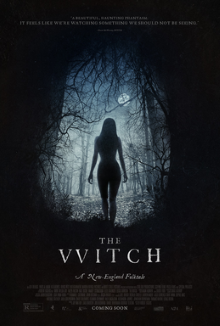
My wife usually doesn’t like horror films but I find them to be useful entries to add to our list because they tend not to be very long. As much as I enjoy serious films, it does get tiring if all that we watch are epics. Of course I do require that they are well reviewed and this one earns its place due to its high Rotten Tomatoes rating and its 17th century New England setting.
A Puritan family moves out of a plantation town due to the religious differences with the other members of the community. They build a farm on the edge of a forest but find it difficult to grow enough food. One day the youngest baby disappears while playing with Thomasin, the eldest daughter. The father tries to take the eldest son, Caleb, hunting despite warnings about how dangerous the woods are, but has no luck. Meanwhile the two younger twins play with a black goat owned by the family, chanting a strange song. After the children overhear their parents discuss giving Thomasin away to another family, Caleb decides to go hunting himself and Thomasin follows him. They are separated when their horse and dog are spooked by a creepy rabbit and Caleb comes across a hut in the woods inhabited by an alluring woman who is obviously a witch. When Thomasin returns to the farm, she is accused of being a witch.
This is very much a traditional witch’s story, played completely straight with no real twists. The tone is dead serious, the autumnal colors pure New England and even the language is archaic. For all that it holds no surprises, the film stands out for how well made it is. A constant sense of dread hangs heavily throughout and it is chilling to modern audiences how tangible their fear of the supernatural is and consequently how heavily they rely on their faith as a shield. Of course in this case they actually do live in a world in which the supernatural does exist so it’s justified but it’s easy to imagine from this portrayal how similarly real it must have felt to the 17th century settlers. I wouldn’t quite say that the effect is truly frightening but there’s an old-school horror vibe here that is very effective. One of Caleb’s scenes for example could have come right out of The Exorcist. By being so thoroughly old-fashioned The Witch ends up being a rather refreshing entry in the horror genre.
From a more meta perspective, it’s interesting to note that the film focuses pretty much exclusively on the family who the victims. Of the antagonists, we know only enough to confirm that the threat is real and the witch follows traditional conventions. Apart from that, we know nothing else, not her name or origin, motivations or abilities. Instead director Robert Eggers lets our imagination fill in the blanks, prompted by old folktales and legends. I think this helps stave off the monster of the week syndrome and elevate it to a touch above the usual commercial fare. It’s also a great reminder that in any good horror film, what truly matters isn’t what the monster does but how the human victims react in the face of that horror.
Since this is a relatively short horror film, there’s not much to say about it save that it’s good. I’m especially pleased that a solid, independent effort like this was able to make a respectable amount of money. A box office return of US$40 million on a budget of US$4 million is nothing to sneeze at.